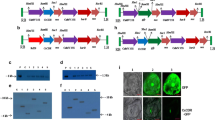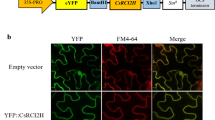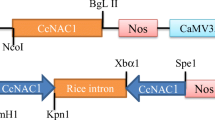Abstract
Pigeonpea (Cajanus cajan L.) cold and drought regulatory protein encoding gene (CcCDR) has been introduced into yeast and tobacco for its functional validation. In yeast, expression of CcCDR imparted marked tolerance against abiotic stresses exerted by PEG and NaCl. Transgenic tobacco lines, expressing CcCDR under the control of CaMV35S and rd29A promoters, when subjected to mannitol, NaCl and cold (4 °C) stress, developed into healthy plants with profuse root system, increased biomass, root length and chlorophyll content in contrast to the weak-stunted wild-type plants. Transgenic plants also showed increased levels of proline, reducing sugars and endogenous abscisic acid (ABA) content. Exogenous ABA treatment resulted in increased hypersensitivity and decreased stomatal aperture size of transgenic plants compared to wild type. Localization studies confirmed that CcCDR could enter the nucleus as revealed by intense fluorescence, indicating its plausible interaction with various nuclear proteins. The overall results amply demonstrate the intrinsic effect of CcCDR in bestowing multiple abiotic stress tolerance at cellular and whole plant levels. Accordingly, the multipotent CcCDR seems promising as a prime candidate gene to fortify crop plants with abiotic stress tolerance.







Similar content being viewed by others
References
Bates LS, Waldran R, Teare ID (1973) Raipid determination of free proline for water studies. Plant Soil 39:205–208
Begcy K, Mariano ED, Gentile A, Lembke CG, Zingaretti SM, Souza GM, Menossi M (2012) A novel stress induced sugarcane gene confers tolerance to drought, salt and oxidative stress in transgenic tobacco plants. PLoS ONE 7(9):e44697
Bray EA (1993) Molecular responses to water deficit. Plant Physiol 103:1035–1040
Cereghino JL, Cregg JM (2000) Heterologous protein expression in the methylotrophic yeast Pichia pastoris. FEMS Microbiol 24:45–66
Elmaghrabi AM, Ochatt S, Rogers HJ, Francis D (2013) Enhanced tolerance to salinity following cellular acclimation to increasing NaCl levels in Medicago truncatula. Plant Cell Tiss Organ Cult 114:61–70
Finkelstein RR, Gampala SSL, Rock CD (2002) Abscisic acid signaling in seeds and seedlings. Plant Cell 14:S15–S45
Frey A, Godin B, Bonnet M, Sotta B, Marion-Poll A (2004) Maternal synthesis of abscisic acid control seed development and yield in Nicotiana plumbaginafolia. Planta 218:958–964
Gutha LR, Reddy AR (2008) Rice DREB1B promoter shows distinct stress-specific responses, and the overexpression of cDNA in tobacco confers improved abiotic and biotic stress tolerance. Plant Mol Biol 68:533–555
Horsch RB, Fry JE, Hoffman NL, Eicholtz D, Rogers SD, Fraley RT (1985) A simple and general method for transferring genes into plants. Science 227:1229–1231
Hu W, Huang C, Deng X, Zhou S, Chen L, Li Y, Wang C, Ma Z, Yuan Q, Wang Y, Cai R, Liang X, Yang G, He G (2013) TaASR1, a transcription factor gene in wheat, confers drought stress tolerance in transgenic tobacco. Plant, Cell Environ 36:1449–1464
Huang XS, Liu JH, Chen XJ (2010) Overexpression of PtrABF gene, a bZIP transcription factor isolated from Poncirus trifoliata, enhances dehydration and drought tolerance in tobacco via scavenging ROS and modulating expression of stress-responsive genes. BMC Plant Biol 10:230
Huang X, Zhang Y, Jiao B, Chen G, Huang S, Guo F, Shen Y, Huang Z, Zhao B (2012) Overexpression of the wheat salt tolerance-related gene TaSC enchances salt tolerance in Arabidopsis. J Exp Bot 63:5463–5473
Iuchi S, Kobayashi M, Taji T, Naramoto M, Seki M, Kato T, Tabata S, Kakubari Y, Yamaguchi-Shinozaki K, Shinozaki K (2001) Regulation of drought tolerance by gene manipulation of 9-cis-epoxycarotenoid dioxygenase, a key enzyme in abscisic acid biosynthesis in Arabidopsis. Plant J 27:325–333
Jiang M, Zhang J (2002) Water stress-induced abscisic acid accumulation triggers the increased generation of reactive oxygen species and up-regulates the activities of antioxidant enzymes in maize leaves. J Exp Bot 53:2401–2410
Jung C, Seo JS, Han SW, Koo YJ, Kim CH, Song SI, Nahm BH, Choi YD, Cheong JJ (2008) Overexpression of AtMYB44 enhances stomatal closure to confer abiotic stress tolerance in transgenic Arabidopsis. Plant Physiol 146:623–635
Kasuga M, Miura S, Shinozaki K, Yamaguchi-Shinozaki K (2004) A combination of the Arabidopsis DREB1A gene and stress inducible RD29A promoter improved drought- and low-temperature stress tolerance in tobacco by gene transfer. Plant Cell Physiol 45:346–350
Kim KN, Cheong YH, Grant JJ, Pandey GK, Luan S (2003) CIPK3, a calcium sensor-associated protein kinase that regulates abscisic acid and cold signal transduction in Arabidopsis. Plant Cell 15:411–423
Kishor KPB, Hong Z, Miao GH, Hu CAA, Verma DPS (1995) Overexpression of D1-pyrroline-5-carboxylate synthetase increase proline production and confers osmotolerance in transgenic plants. Plant Physiol 108:1387–1394
Krasensky J, Jonak C (2012) Drought, salt, and temperature stress-induced metabolic rearrangements and regulatory networks. J Exp Bot 63:1593–1608
Kudo K, Oi T, Uno Y (2014) Functional characterization and expression profiling of a DREB2- type gene from lettuce (Lactuca sativa L.). Plant Cell Tiss Organ Cult 116:97–109
Lee JH, Montagu MV, Verbruggen N (1999) A highly conserved kinase is an essential component for stress tolerance in yeast and plant cells. Proc Natl Acad Sci USA 96:5873–5877
Lehmann S, Funck D, Szabados L, Rentsch D (2010) Proline metabolism and transport in plant development. Amino Acids 39:949–962
Long L, Gao W, Xu L, Liu M, Luo X, He X, Yang X, Zhang X, Zhu L (2014) GbMPK3, a mitogen-activated protein kinase from cotton, enhances drought and oxidative stress tolerance in tobacco. Plant Cell Tiss Organ Cult 116:153–162
Mao X, Chen S, Li A, Zhai C, Jing R (2014) Novel NAC Transcription Factor TaNAC67 Confers Enhanced Multi-Abiotic Stress Tolerances in Arabidopsis. PLoS ONE 9(1):e84359
Miller GL (1959) Use of dinitrosalicylic acid reagent for determination of reducing sugars. Anal Chem 31:426–428
Mukhopadhyay A, Vij S, Tyagi AK (2004) Overexpression of a zinc-finger protein gene from rice confers tolerance to cold, dehydration, and salt stress in transgenic tobacco. Proc Natl Acad Sci USA 101:6309–6314
Priyanka B, Sekhar K, Reddy VD, Rao KV (2010) Expression of pigeonpea hybrid-proline-rich protein encoding gene (CcHyPRP) in yeast and Arabidopsis affords multiple abiotic stress tolerance. Plant Biotechnol J 8:76–87
Saghai-Maroof MA, Soliman KM, Jorgensen RA, Allard RW (1984) Ribosomal DNA spacer-length polymorphisms in barley: Mendelian inheritance, chromosomal location and population dynamics. Proc Natl Acad Sci USA 81:8014–8019
Sambrook J, Russell DW (2001) Molecular cloning a laboratory manual. Cold Spring Harbor Laboratory Press, Cold Spring Harbor
Sekhar K, Priyanka B, Reddy VD, Rao KV (2010) Isolation and characterization of a pigeonpea cyclophilin (CcCYP) gene, and its over-expression in Arabidopsis confers multiple abiotic stress tolerance. Plant, Cell Environ 33:1324–1338
Sekhar K, Priyanka B, Reddy VD, Rao KV (2011) Metallothionein 1 (CcMT1) of pigeonpea (Cajanus cajan L.) confers enhanced tolerance to copper and cadmium in Escherichia coli and Arabidopsis thaliana. Environ Exp Bot 72:131–139
Shinozaki K, Yamaguchi Shinozaki K (1997) Gene expression and signal transduction in water stress response. Plant Physiol 115:327–334
Shinozaki K, Yamaguchi-Shinozaki K, Seki M (2003) Regulatory network of gene expression in the drought and cold stress responses. Curr Opin Plant Biol 6:410–417
Silva-Ortega CO, Ochoa-Alfaro AE, Reyes-Agüero JA, Aguado-Santacruz GA, Jiménez-Bremont JF (2008) Salt stress increases the expression of p5cs gene and induces proline accumulation in cactus pear. Plant Physiol Biochem 46:82–92
Surekha Ch, Nirmala Kumari K, Aruna LV, Suneetha G, Arundhati A, Kavi Kishor PB (2014) Expression of the Vigna aconitifolia P5CSF129A gene in transgenic pigeonpea enhances proline accumulation and salt tolerance. Plant Cell Tiss Organ Cult 116:27–36
Szabados L, Savoure A (2010) Proline: a multifunctional amino acid. Trends Plant Sci 15:89–97
Tang Y, Liu M, Gao S, Zhang Z, Zhao X, Zhaoa C, Zhanga F, Chenb X (2012) Molecular characterization of novel TaNAC genes in wheat and overexpression of TaNAC2a confers drought tolerance in tobacco. Physiol Plant 144:210–224
Wang C, Deng P, Chen L, Wang X, Ma H, Hu W, Yao N, Feng Y, Chai R, Yang G, He G (2013) A wheat WRKY transcription factor TaWRKY10 confers tolerance to multiple abiotic stresses in transgenic tobacco. PLoS ONE 8:e65120
Xing X, Liu YK, Kong XP, Liu Y, Li DQ (2011) Overexpression of a maize dehydrin gene, ZmDHN2b, in tobacco enhances tolerance to low temperature. Plant Growth Regul 65:109–118
Yesilirmak F, Sayers Z (2009) Heterologous expression of plant genes. Int J Plant Genomics. doi:10.1155/2009/296482
Acknowledgments
We are grateful to Osmania University for the support and TS is thankful to the University Grants Commission, New Delhi, for the award of Research Fellowship. We are thankful to Prof. T. Papi Reddy for critical reading and improving the manuscript.
Author information
Authors and Affiliations
Corresponding author
Rights and permissions
About this article
Cite this article
Tamirisa, S., Reddy, V.D. & Rao, K.V. Ectopic expression of pigeonpea cold and drought regulatory protein (CcCDR) in yeast and tobacco affords multiple abiotic stress tolerance. Plant Cell Tiss Organ Cult 119, 489–499 (2014). https://doi.org/10.1007/s11240-014-0549-6
Received:
Accepted:
Published:
Issue Date:
DOI: https://doi.org/10.1007/s11240-014-0549-6




